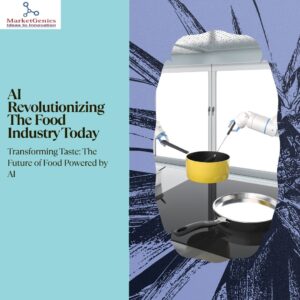AI Revolutionizing The Food Industry
Transforming Taste: The Future of Food Powered by AI
AI in Food Processing and Supply Chain has become quite popular in recent years. It makes use of the tools like computer vision, machine learning, and predictive analytics to improve food production, agriculture, quality, supply chain management, and customer satisfaction. In these respects, AI has led to sustainability, efficiency, and innovation in a food ecosystem.
The global AI market in food and beverages is expected to grow at an impressive CAGR of 39.1% from 2024 to 2030.
AI in Agriculture: Sustainability and Productivity
Growing demand and a rise in population have made AI an essential tool in the food production industry. AI systems help farmers by not only predictive analysis which leads to improved crop yield but also reduces wastage. Many AI-powered tools like IoT sensors and satellite imagery provide real-time essential information regarding soil health, water levels, and weather patterns to support decision making. AI supports waste reduction through optimizing irrigation schedules, fertilizer application, and pest control strategies. Advancements in AI technology align well with global need of sustainable agriculture and environmental preservation.

Some companies using AI effectively in Agriculture are as follows-
1. Raven Industries: Precision agricultural tools, which enable higher productivity in farming, fall under Raven Industries. These inputs ensure application of inputs more precisely, hence also reducing the waste and allowing an improvement in crop health.
2. CNH Industrial: AI and automation are part and parcel of CNH Industrial agricultural machinery. Farmer intelligent tractors and combines enable them to maximize fieldwork and provide better crop management. Perhaps one of the best-known developments is a predictive maintenance system that uses AI to predict and prevent machine failure.
Production: Quality and Efficiency
AI in Production: Quality and Efficiency
AI has turned out to be an efficient food source by bettering the production processes for a better yield in quality and quantity. Artificial Intelligence reduces human error and ensures consistent quality across batches. AI is now used by various companies, which ensure good manufacturing practices. AI-powered robots and vision systems guarantee hygiene and accuracy, while predictive maintenance solutions reduce downtime, making manufacturing productive and economical. The international AI market is expected to grow from USD 638.23 billion in 2024 to USD 3,680.47 billion by 2034 at a sensational CAGR of 19.1%, which speaks volumes for the gigantic innovative potential.
1. NotCo: this firm employs AI to create plant-based alternatives to animal-based food items. Their own AI systems, Giuseppe, analyze the molecular composition of animal products to identify plant-based alternatives that can replicate their taste, texture and performance.
AI in Retail: Reducing Waste and Helping Supply Chain
Companies globally are widely using AI to address critical challenges like food waste and inventory management. AI is accurately predicting demand by analysing historical sales data, seasonal trends, and consumer demand.
AI widely helps in sales. It provides product recommendations and personalized offers thus, enhancing customer experiences while driving sales. AI has also helped retailers all across the world to serve customers effortlessly across urban and rural areas.
Some companies using AI for sorting and checking quality are as follows-
- Tomra Neon: it’s a sorting and grading app that rejects and accepts fruits based on quality. It identifies, differentiates and removes unwanted clusters, undersize fruit and unripe fruit, according to the release.
- Walmart: In order to improve its AI-driven inventory management and lower spoilage, Walmart purchased Alert Innovation.
- Danone: especially for fresh, plant-based products, its adoption of AI in supply chain management has accelerated since its merger with WhiteWave Foods.
AI in Food Delivery
With the introduction of AI into the global food market, the delivery system has improved drastically. Many new Food delivery companies are opening which are helping in delivering food by small business owners which was difficult earlier. Some of the giants in food delivery are listed below-
- Zomato: Zomato offers a huge number of restaurants to choose from; hence the user can explore various cuisines and dining options. Applying this feature, Zomato can provide table reservations, food delivery tracking, and payment options within the very same interface, making it a complete food-service app.
- Swiggy: The app and website are self-explanatory and painless to use so that customers can place their food orders in a jiffy. There also comes the facility of tracking the orders in real-time, thus providing maximum transparency and almost eliminating fear for delivery times.
Challenges of AI in the Food Industry
Several challenges in AI put forward in the food industry include-
1. Data Quality Issues: A lot of projects in AI fail because their model depends on data sets that are incomplete, inaccurate, or improperly labelled. Such data causes confusion and misinterpretation leading to losses.
2. High Cost: The installation and maintenance costs are quiet high making it difficult to develop and implement as per a specific business.
3. Integration complexities: using AI systems can be difficult as it requires huge investment and continuous adaptation. It will require additional technical expertise.
Conclusion
As we experience rapid urbanization and increased digital adoption, the integration of Artificial Intelligence in the food industry is set to accelerate significantly. The world is on the verge of a food revolution with the growing use of AI in agriculture, production, retail, and delivery. With MarketGenics research reports further giving clear picture of the evolution and statics, a company in AI food can grow exponentially.
